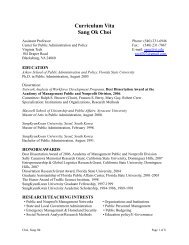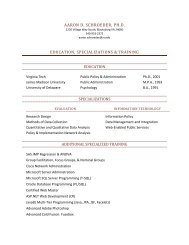1 Towards a Critical Social Theory of Philanthropy in an Era of ...
1 Towards a Critical Social Theory of Philanthropy in an Era of ...
1 Towards a Critical Social Theory of Philanthropy in an Era of ...
You also want an ePaper? Increase the reach of your titles
YUMPU automatically turns print PDFs into web optimized ePapers that Google loves.
position that is deme<strong>an</strong><strong>in</strong>g <strong>an</strong>d destructive to the hum<strong>an</strong> spirit because ask<strong>in</strong>g for help c<strong>an</strong> be<br />
perceived as <strong>an</strong> admission <strong>of</strong> <strong>in</strong>adequacy (Menn<strong>in</strong>ger 2000, 211). This uncritical accept<strong>an</strong>ce <strong>of</strong><br />
relationships <strong>of</strong> dom<strong>in</strong>ation enables cruel behavior to occur <strong>in</strong> the name <strong>of</strong> virtue. As Wagner<br />
(2000) notes: "the rhetoric <strong>of</strong> virtue has always coexisted with a deep-seated streak <strong>of</strong> violent<br />
repression <strong>in</strong> America: the physical <strong>an</strong>d cultural genocide aga<strong>in</strong>st Americ<strong>an</strong> Indi<strong>an</strong>s, the<br />
enslavement <strong>of</strong> Afric<strong>an</strong>s, <strong>an</strong>d the conquer<strong>in</strong>g <strong>of</strong> foreign l<strong>an</strong>ds" (5).<br />
<strong>Phil<strong>an</strong>thropy</strong> as it is understood <strong>an</strong>d practiced today presupposes that there must be a<br />
dist<strong>in</strong>ction between what <strong>an</strong> <strong>in</strong>dividual needs <strong>an</strong>d a society needs. Need becomes someth<strong>in</strong>g<br />
towards which we direct resources on <strong>an</strong> <strong>in</strong>dividual basis, absolv<strong>in</strong>g the system <strong>of</strong> responsibility<br />
for the abuses that it renders. This <strong>in</strong>dividualization <strong>of</strong> need immediately absolves society as a<br />
whole <strong>of</strong> responsibility for the needs <strong>of</strong> its members <strong>an</strong>d social responsibility becomes <strong>in</strong>dividual<br />
responsibility. Thus, through the use <strong>of</strong> metaphysics, phil<strong>an</strong>thropy is able act as the social policy<br />
<strong>of</strong> the rul<strong>in</strong>g classes <strong>in</strong> its distribution <strong>of</strong> resources, allow<strong>in</strong>g wealthy elites to cover up the<br />
hegemonic control they have <strong>in</strong> society <strong>an</strong>d which perpetuates their wealth <strong>an</strong>d powerful<br />
positions (Arnove 1980; Roel<strong>of</strong>s 1995). This is particularly true <strong>in</strong> <strong>an</strong> era <strong>of</strong> govern<strong>an</strong>ce, which<br />
devolves responsibility for alleviat<strong>in</strong>g social problems to those with the f<strong>in</strong><strong>an</strong>cial, org<strong>an</strong>izational,<br />
or political resources to ga<strong>in</strong> access (Hirst 2000).<br />
The task <strong>of</strong> critical phil<strong>an</strong>thropy consists “<strong>of</strong> show<strong>in</strong>g how the marg<strong>in</strong>als are <strong>in</strong> fact<br />
<strong>in</strong>ternal to the bourgeois system, how the purity <strong>of</strong> society is already contam<strong>in</strong>ated by a blight it<br />
would prefer, for its own protection, to consider as external” (Ry<strong>an</strong> 1982, 127). The key po<strong>in</strong>t<br />
made by Ry<strong>an</strong> (1982) is that blights on the system, such as those addressed by phil<strong>an</strong>thropy, are<br />
not external. Much <strong>of</strong> the suffer<strong>in</strong>g that phil<strong>an</strong>thropy aims to alleviate is not the result <strong>of</strong> a lack<br />
13






